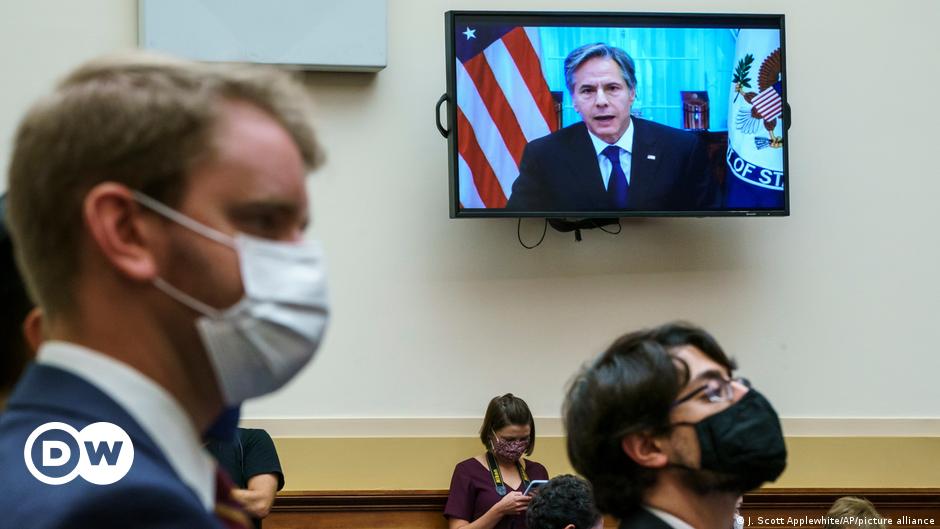
Antony Blinken on Monday fielded questions on Afghanistan at the House of Representatives’ Foreign Affairs Committee on Monday.
He sought to blame Donald Trump’s deal with the Taliban for the US exit completed under Joe Biden, while arguing that a longer stay in the country would not have helped.
“We inherited a deadline. We did not inherit a plan,” Blinken said. He alleged that the February 2020 agreement to draw down international troop numbers in exchange for a series of assurances from the Taliban put the Islamist movement in “the strongest military position it had been since 9/11.”
Why did the US not predict Afghan collapse?
Blinken said President Joe Biden and his staff were “intensely focused” on the safety of the country’s citizens as US forces pulled out.
He added that the administration had “planned and exercised a wide range of contingencies” for what would come after the troop pullout which it was “constantly assessing.”
But Blinken said that “even the most pessimistic assessments did not predict that government forces in Kabul would collapse while US forces remained.”
The chaotic evacuation of thousands who helped the West caught global attention
He praised the “extraordinary effort” of the evacuation that airlifted 124,000 people from Kabul.
A committee member from the Republican party, Mike McCaul, called the end to the 20-year Afghanistan war “an unmitigated disaster of epic proportions.”
“I never thought in my lifetime that I would see an unconditional surrender to the Taliban,” he said.
Afghanistan: Altered life under the Taliban It’s a man’s world Photos and videos emerging from Afghanistan show bustling activity returning to the streets of cities — as at this restaurant in Herat, where customers are being welcomed back. But there is one conspicuous difference from before: At the tables are men and men alone, often wearing the traditional knee-long tunic. Women have become a rarity in the cityscape.
Afghanistan: Altered life under the Taliban Keep them separated A curtain divides these students at a private university in Kabul. Gender separation is now the official policy here — and that is likely to spread. “Co-education contradicts the principles of Islam as well as national values, customs and traditions,” said Abdul Baghi Hakkani, the incoming minister for higher education, in Kabul.
Afghanistan: Altered life under the Taliban Lost freedoms Like for these women, on their way to a mosque in Herat — after 20 years of allied forces holding the Taliban at bay, freedoms won by women have been quickly erased. Even sports will be off-limits for female players, said Ahmadullah Wasik, deputy head of the Taliban’s Cultural Commission.
Afghanistan: Altered life under the Taliban Omnipresent checkpoints Street scenes are also dominated by Taliban checkpoints. As heavily armed men intimidate the populace, people seek to blend in. Western-style clothing is becoming ever rarer — and the sight of heavily armed soldiers, more common.
Afghanistan: Altered life under the Taliban Waiting for work Male day laborers sit at the roadside in Kabul, awaiting a job offer. Afghanistan, already in a precarious economic situation before the Taliban takeover, is now teetering on economic collapse, with unemployment ballooning. The United Nations has said that “universal poverty” threatens to overtake the country within a year. That would be a poverty rate of around 98%, compared to 72% currently.
Afghanistan: Altered life under the Taliban Not going down without a fight Afghan women, despite being brutally suppressed, continue to demand their right to education, work and equal rights. But peaceful protests are being met with escalating violence, the UN human rights office warns. The radical Islamists have used batons, whips and live ammunition against protesters, with at least four killings and many more beatings.
Afghanistan: Altered life under the Taliban The ‘pro’ side These women, on the other hand, say they are happy with the new order. Escorted by official security, they march the streets claiming full satisfaction with the attitudes and behavior of the Taliban. Such women say those fleeing the country do not represent them and believe that the Islamist rules ensure their safety.
Afghanistan: Altered life under the Taliban Aligning course The pro-Taliban demonstration included invitations for journalists, in contrast to anti-Taliban protests. At the latter, journalists report having been intimidated or even abused. It’s a clear sign of the changed times — particularly for women. Author: Claudia Dehn, Sonya Angelica Diehn
Could the US have stayed for longer?
McCaul continued to interrogate Blinken by saying that Afghanistan “was now at the mercy of Taliban’s reign of terror” and the “dark veil of sharia law.”
A Republican colleague, Greg Steube, argued that the Trump accord with the Taliban had set conditions which were not kept, telling Blinken, “you can’t blame the Trump administration for your failure.”
But Blinken argued that when the Taliban violated the terms of the Trump deal, Biden would have had to send “substantially more” troops into the country to regain control.
“There’s no evidence that staying longer would have made the Afghan security forces or the Afghan government any more resilient or self-sustaining,” Blinken said.
Watch video 00:38 Blinken blames Afghan security forces of being unable to defend country
“If 20 years and hundreds of billions of dollars in support, equipment and training did not suffice, why would another year, another five, another 10?” he asked rhetorically.
The Democrat who chairs the committee, Gregory Meeks, concluded that he did not believe it was possible to make “a smooth withdrawal from a messy, chaotic 20-year war.”
Blinken will face questions on Afghanistan from the equivalent committee in the upper chamber of Congress, the Senate, on Tuesday.
jc/msh (AFP, AP)






